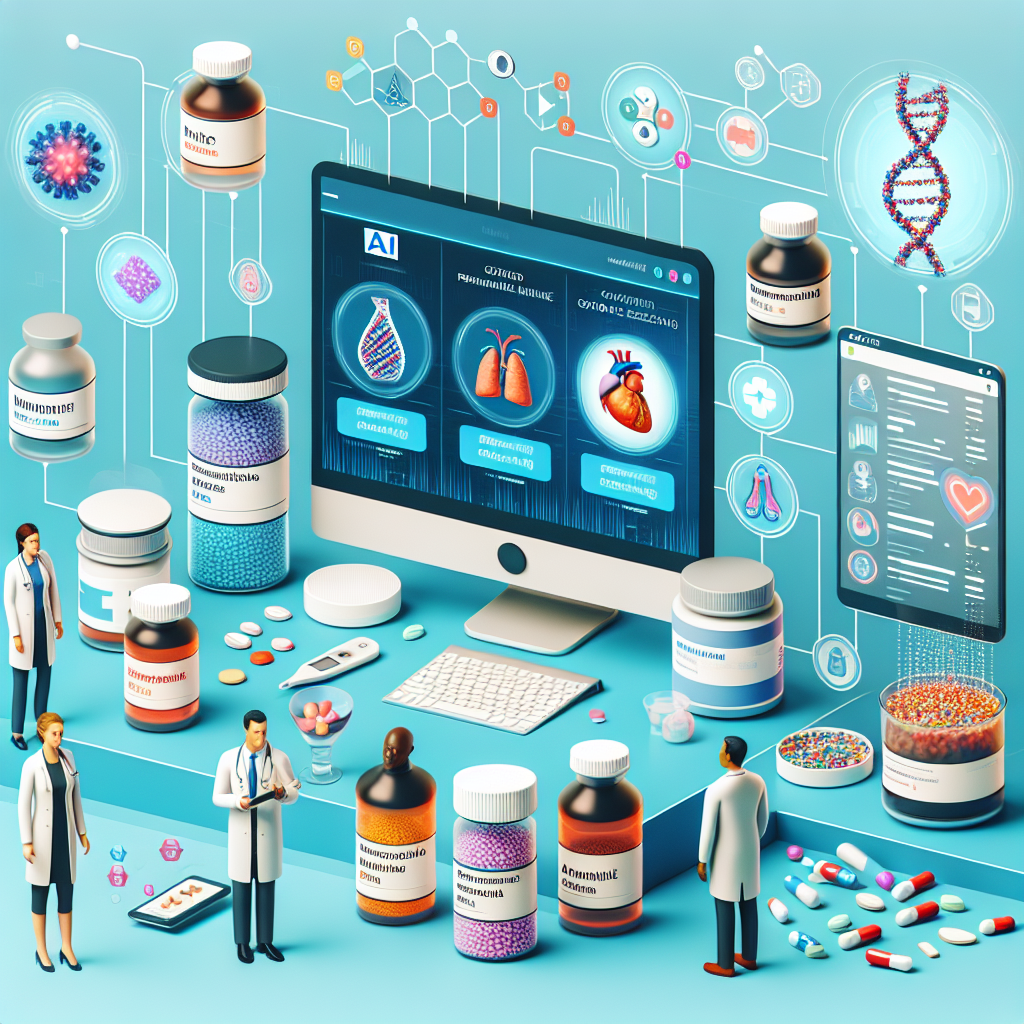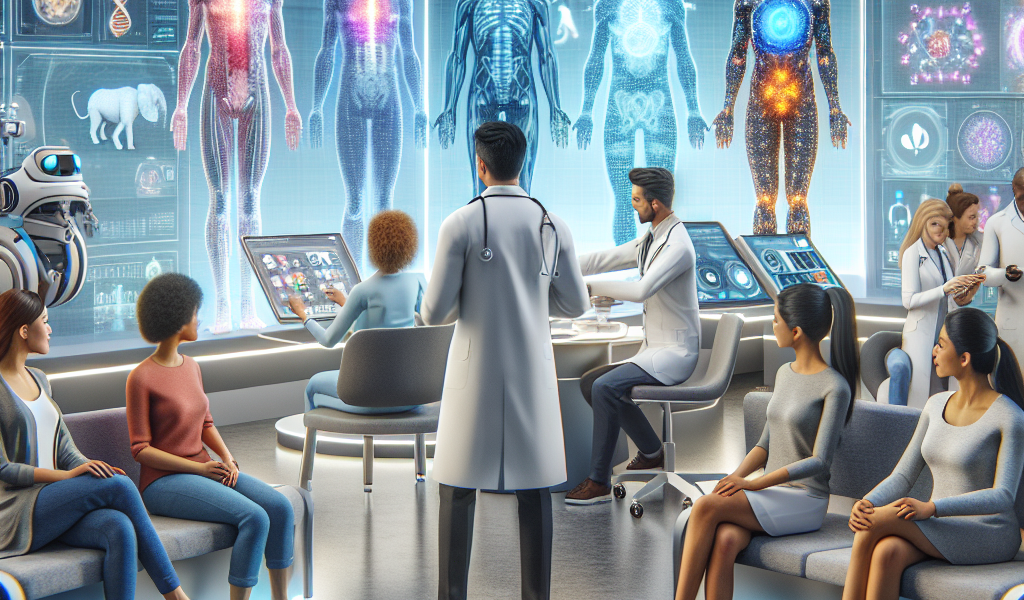-
Table of Contents
“Tailoring Tomorrow’s Treatments Today”
Introduction

The Future of Personalized Medicine
Personalized medicine represents a transformative approach to healthcare, leveraging advances in genomics, biotechnology, and data analytics to tailor medical treatments to individual patients. By considering unique genetic profiles, environmental factors, and lifestyle choices, personalized medicine aims to optimize therapeutic efficacy and minimize adverse effects. This paradigm shift promises to revolutionize disease prevention, diagnosis, and treatment, fostering a more precise and patient-centric healthcare system. As technological innovations continue to evolve, the integration of personalized medicine into clinical practice holds the potential to significantly enhance patient outcomes and pave the way for a new era of medical care.
Advances In Genomic Sequencing And Its Impact On Personalized Medicine
Advances in genomic sequencing are revolutionizing the field of personalized medicine, offering unprecedented opportunities to tailor medical treatments to individual patients. This cutting-edge technology, which involves decoding the complete set of DNA in a person’s cells, has become faster, more accurate, and more affordable over the past decade. As a result, it is now possible to identify genetic variations that contribute to diseases and to develop targeted therapies that address these specific genetic factors.
One of the most significant impacts of genomic sequencing on personalized medicine is its ability to identify genetic predispositions to certain conditions. For instance, individuals with specific genetic mutations may be at a higher risk for developing cancers, cardiovascular diseases, or neurological disorders. By understanding these genetic risks, healthcare providers can implement early screening and preventive measures, potentially reducing the incidence and severity of these conditions. Moreover, patients can make informed lifestyle choices that may mitigate their risk factors.
In addition to risk assessment, genomic sequencing has transformed the way we approach the treatment of diseases. Traditional medicine often relies on a one-size-fits-all approach, which may not be effective for everyone. However, with the insights gained from genomic data, treatments can be customized to the genetic profile of each patient. This is particularly evident in the field of oncology, where targeted therapies have shown remarkable success. For example, certain types of breast cancer are driven by specific genetic mutations, and drugs that target these mutations have significantly improved patient outcomes.
Furthermore, genomic sequencing has paved the way for the development of precision medicine, which goes beyond simply matching treatments to genetic profiles. Precision medicine takes into account a wide range of factors, including environmental influences, lifestyle, and even the microbiome—the community of microorganisms living in and on our bodies. By integrating these diverse data points, healthcare providers can develop comprehensive treatment plans that are uniquely suited to each patient.
The impact of genomic sequencing on personalized medicine is not limited to treatment and prevention. It also extends to the realm of pharmacogenomics, the study of how genes affect a person’s response to drugs. This field has the potential to revolutionize the way medications are prescribed, ensuring that patients receive the most effective drugs with the fewest side effects. For example, some individuals may metabolize certain medications too quickly or too slowly, leading to ineffective treatment or adverse reactions. By analyzing a patient’s genetic makeup, doctors can select the appropriate drug and dosage, optimizing therapeutic outcomes.
Despite these promising advancements, there are challenges that need to be addressed to fully realize the potential of personalized medicine. One major concern is the ethical and privacy issues surrounding the use of genetic data. Ensuring that patients’ genetic information is protected and used responsibly is paramount. Additionally, there is a need for greater accessibility and affordability of genomic sequencing technologies, so that the benefits of personalized medicine can be extended to a broader population.
In conclusion, the advances in genomic sequencing are having a profound impact on personalized medicine, enabling more precise and effective healthcare. By identifying genetic risks, tailoring treatments, and optimizing drug prescriptions, this technology is paving the way for a new era of medicine that is truly personalized. As we continue to overcome the challenges and expand the reach of these innovations, the future of personalized medicine looks incredibly promising.
The Role Of Artificial Intelligence In Tailoring Individualized Treatment Plans
The future of personalized medicine is rapidly evolving, and at the heart of this transformation lies the remarkable potential of artificial intelligence (AI). As healthcare continues to shift from a one-size-fits-all approach to more individualized treatment plans, AI is emerging as a pivotal tool in tailoring therapies to meet the unique needs of each patient. This shift is not just a technological advancement but a paradigm change that promises to revolutionize the way we understand and treat diseases.
Artificial intelligence, with its ability to process vast amounts of data quickly and accurately, is uniquely positioned to analyze the complex biological information that underpins personalized medicine. By leveraging machine learning algorithms, AI can sift through genetic, environmental, and lifestyle data to identify patterns and correlations that might be invisible to the human eye. This capability is particularly valuable in the realm of genomics, where the sheer volume of data can be overwhelming. AI can help decode the human genome, identifying specific genetic mutations and variations that may influence an individual’s response to certain treatments.
Moreover, AI’s role in personalized medicine extends beyond genetic analysis. It also encompasses the integration of electronic health records (EHRs), medical imaging, and even wearable technology data. By synthesizing information from these diverse sources, AI can provide a comprehensive view of a patient’s health, enabling more accurate diagnoses and more effective treatment plans. For instance, AI algorithms can analyze EHRs to predict which patients are at higher risk for certain conditions, allowing for earlier intervention and potentially better outcomes.
Transitioning from data analysis to practical application, AI is also making strides in drug development and clinical trials. Traditional drug development is a lengthy and costly process, often taking years and billions of dollars to bring a new medication to market. AI has the potential to streamline this process by identifying promising drug candidates more quickly and predicting their efficacy and safety profiles. In clinical trials, AI can help match patients with the most appropriate studies based on their unique genetic and health profiles, increasing the likelihood of successful outcomes and reducing the time needed to bring new treatments to patients.
Furthermore, AI’s ability to continuously learn and adapt makes it an invaluable asset in the ongoing management of chronic diseases. For patients with conditions such as diabetes or heart disease, AI-powered tools can monitor health metrics in real-time, providing personalized recommendations and alerts to both patients and healthcare providers. This proactive approach not only enhances patient engagement but also helps prevent complications and improve overall quality of life.
Despite these promising advancements, the integration of AI into personalized medicine is not without challenges. Issues related to data privacy, algorithmic bias, and the need for robust regulatory frameworks must be addressed to ensure that AI-driven solutions are both ethical and effective. Additionally, the healthcare industry must invest in training and education to equip clinicians with the skills needed to harness AI’s full potential.
In conclusion, the role of artificial intelligence in tailoring individualized treatment plans is a cornerstone of the future of personalized medicine. By harnessing the power of AI to analyze complex data, streamline drug development, and manage chronic diseases, we are on the cusp of a new era in healthcare. This transformation promises not only to improve patient outcomes but also to make healthcare more efficient and accessible. As we navigate the challenges and opportunities ahead, the collaboration between technology and medicine will undoubtedly pave the way for a healthier future.
Ethical Considerations And Challenges In Personalized Medicine
As the field of personalized medicine continues to evolve, it promises to revolutionize healthcare by tailoring treatments to individual genetic profiles. However, this exciting frontier is not without its ethical considerations and challenges. One of the most pressing issues is the question of privacy. With the increasing use of genetic information, there is a growing concern about how this sensitive data is stored, shared, and protected. Patients must trust that their genetic information will not be misused or accessed without their consent. This trust is crucial for the widespread adoption of personalized medicine, yet it is continually tested by data breaches and the potential for misuse by third parties, such as insurance companies or employers.
Moreover, the issue of equity cannot be overlooked. Personalized medicine has the potential to exacerbate existing healthcare disparities. Access to advanced genetic testing and tailored treatments may be limited to those who can afford it, leaving marginalized communities behind. This raises the question of how to ensure that the benefits of personalized medicine are distributed fairly across different socioeconomic groups. Policymakers and healthcare providers must work together to create frameworks that promote inclusivity and prevent the deepening of healthcare inequities.
In addition to privacy and equity, there is the challenge of informed consent. The complexity of genetic information can make it difficult for patients to fully understand what they are agreeing to when they consent to genetic testing. This complexity necessitates clear communication from healthcare providers to ensure that patients are making informed decisions about their health. Furthermore, the dynamic nature of genetic research means that new information can emerge after a test has been conducted, potentially altering the implications of the results. This ongoing evolution requires a continuous dialogue between patients and healthcare providers to keep patients informed and engaged in their healthcare decisions.
Another ethical consideration is the potential for genetic discrimination. As genetic testing becomes more common, there is a risk that individuals could be discriminated against based on their genetic predispositions. This could manifest in various ways, from higher insurance premiums to employment discrimination. Legal protections, such as the Genetic Information Nondiscrimination Act (GINA) in the United States, are essential to safeguard individuals from such discrimination. However, these protections must be continually reviewed and updated to keep pace with advancements in genetic research and technology.
Furthermore, the commercialization of genetic data presents another layer of ethical complexity. Companies that offer direct-to-consumer genetic testing services often collect vast amounts of genetic information. While these companies provide valuable insights to consumers, they also have the potential to profit from the sale of genetic data to third parties. This raises questions about the ownership of genetic information and the extent to which individuals should be compensated for the use of their genetic data. Transparency from companies about how genetic information is used and shared is crucial to maintaining consumer trust.
Lastly, the rapid pace of advancements in personalized medicine poses a challenge for regulatory bodies. Ensuring that new treatments and technologies are safe and effective requires robust regulatory frameworks that can keep up with the speed of innovation. This necessitates a balance between fostering innovation and protecting public health. Regulatory agencies must be agile and proactive in their approach to overseeing personalized medicine.
In conclusion, while personalized medicine holds immense promise for the future of healthcare, it also presents a myriad of ethical considerations and challenges. Addressing these issues requires a collaborative effort from all stakeholders, including patients, healthcare providers, policymakers, and regulatory bodies. By navigating these challenges thoughtfully and ethically, we can harness the full potential of personalized medicine to improve health outcomes for all.
Conclusion
The future of personalized medicine holds immense promise, with advancements in genomics, biotechnology, and data analytics paving the way for highly individualized treatment plans. This approach aims to optimize therapeutic efficacy and minimize adverse effects by tailoring medical interventions to the unique genetic, environmental, and lifestyle factors of each patient. As technology continues to evolve, personalized medicine is expected to revolutionize healthcare by enabling early disease detection, precise diagnostics, and targeted therapies, ultimately improving patient outcomes and reducing healthcare costs. However, challenges such as data privacy, ethical considerations, and equitable access must be addressed to fully realize its potential.




